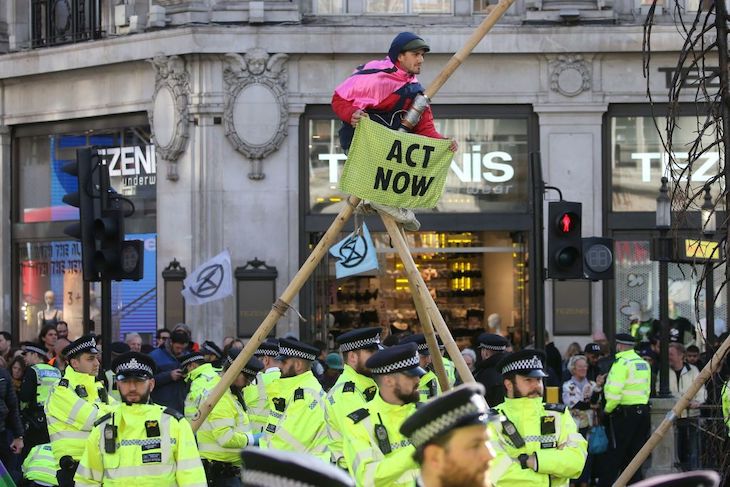After a long period of disruption, the Metropolitan Police’s decision to crack down on Extinction Rebellion and clear them from the streets was greeted with cheers across the capital last week.
The actions of the police are certainly understandable. This month, the Met had to request urgent reinforcements from dozens of forces across the country, including 100 officers from Scotland. And if the idea of Scots keeping the peace in the English capital wasn’t embarrassing enough for the force, the newcomers rubbed salt in the wound by leaving Scottish police stickers on the Met’s vehicles.
Londoners, many of whom are sympathetic to the movement, have also had their patience stretched. Scenes of otherwise civilised tube commuters reverting to a state of nature when faced with troublemakers suggests that the Extinction Rebellion activists were lucky to end up in the hands of the law, rather than the public.
Yet, as easy as it is to take a degree of unkind amusement in tales of earnest Extinction Rebellion activists being unglued from tents by police, I’ve cautioned myself against relief. Consider this question: what do Extinction Rebellion, the Oxford sticker menace and a number of Christian street-preachers have in common?
The answer is that they’ve all been pursued under the auspices of The Public Order Act (1986); a flexible piece of legislation which is now very much back in vogue. Created to crack down on striking miners, and subsequently updated with a swathe of hate speech regulations, the law gives the police wide-ranging discretion to settle disagreements on the street.
One of the most commonly utilised parts of the Act (Section 4A) gives police the power to determine whether ‘insulting’ public speech or writings are being used ‘to cause a person harassment, alarm or distress.’ Falling foul of a policeman’s judgment on this matter could lead to you facing six months in prison.
Even if you think this is a good thing, you may not be reassured by law enforcement’s use of the legislation recently in Oxford. In March, a series of stickers appeared in the city centre with messages including ‘Woman: noun. Adult human female’ and ‘Women don’t have penises’. Responding to complaints of transphobia, Thames Valley Police said those responsible could be charged with a public order offence, and launched an investigation into, what it assures us is a ‘serious crime’.
Elsewhere, there has been a chilling pattern of Christian street-preachers being carted-off in police wagons. In February this year, Oluwole Ilesanmi was arrested whilst trying to preach outside Southgate Station in London. Though he was not charged with a crime, a letter to the Metropolitan Police Commissioner from the Christian Legal Centre (CLC), which took up Ilesanmi’s case, made clear their concerns about police interpretation of public order legislation – citing nine arrests of preachers since 2015.
Personal bias is an obvious worry when asking officers to intervene in subjective matters, such as political or religious debates, but one case points to another risk – public pressure. In July 2016, four men – Don Karns, Michael Stockwell, Michael Overd and Maj. Adrian Clark – were preaching in Bristol city centre. They reportedly urged Muslims to convert to Christianity, said ‘all Muslims will burn in hell’, and claimed that sex outside marriage is a sin – the group quickly drew a large and angry congregation.
By the time police arrived the situation was tense and the preachers were surrounded. A quick decision was needed and the men-on-the-spot soon decided whose defence to rush to. In the end, onlookers cheered as the four men were led away by the police, and were charged with public order offences. According to the CLC, these offences included POA Section 5: ‘threatening or abusive words or behaviour within the hearing or sight of a person likely to be caused harassment, alarm or distress thereby’. (We can only assume that there weren’t enough seats in the police van for the people who had been yelling abuse at the preachers.)
Charges against two of the men were dropped after seven months, but the others were successfully convicted and fined, although their convictions were overturned by the Crown Court a year after their arrest.
All this brings us back to Extinction Rebellion. Why do you suppose the police waited until the public mood turned before they acted to clear the protestors? The conditions of the powers used may offer a clue. POA Section 14 – which allows police to define the size, duration and location of a protest – can be applied in the case of ‘serious disruption to the life of the community’, or ‘intimidation of others with a view to compelling them not to do an act they have a right to do, or to do an act they have a right not to do’. If you think these conditions sound like they could be interpreted to apply to many large-scale protests and strikes, you’re right. You’d also be right to point out that these conditions were met at the beginning of Extinction Rebellion’s disruptions, and the police could have cleared them from the streets on the first day of the protest.
So what changed? As with many ill-defined rules, the use of Section 14 is susceptible to public pressure. In the case of a sympathy-invoking cause like climate change, the goodwill lasted about a week. In other cases – say, pro-life protests – the police tolerance of roadblocks is unlikely to last more than an hour.
None of this is good news for anyone who cares amount the representation of minority views. However much as we may relish our opponents being dragged out of Trafalgar Square, much of the Public Order Act leaves us exposed to the political biases of police officers and the whim of the mob.
Perhaps those sticker-planting Scottish policemen should take note.






Comments